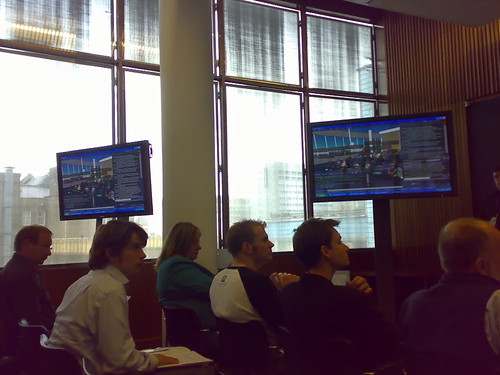Eduserv Symposium 2007: Virtual worlds, real learning
(Note - For the purposes of this post, I'll be using the quasi-conventional shorthand of RL to mean 'real life', as opposed to SL meaning 'Second Life'.)

Just got back from the Eduserv Symposium 2007 in London. An interesting event which, however you cut it, became essentially a review of the relevance or otherwise of Second Life to education, despite the title of the conference suggesting virtual worlds in general. Andy Powell (host, and Director of Development, Eduserv Foundation), quite reasonably cited the 'Hoover' example, where a generic product becomes labeled by its most successful or well-known brand. While Andy acted as master of ceremonies in RL, Pete Johnstone performed the same role in SL. Because of inherent limitations in SL regarding numbers of concurrent occupants in any given virtual region, the SL candidates were distributed across three regions. Pete was taking care of all three: it looked like he was working hard all day! This is the first conference I have been to where the 'virtual attendance' of delegates was more than an incidental aspect. In this case it was a core feature of the conference, with the real-life (RL) delegates being able to see the avatars of the delegates attending virtually in SL on several large screens in the auditorium. I had anticipated something like this, but not the prominence of these screens. The effect, for me at least, was of extending the auditorium into SL through large 'windows'. I thought it worked really well - it would have required not a little courage on the part of the organisers to try this. As I was there in RL, I obviously didn't experience the conference from the other side of the 'mirror', but I was able to read some of the comments from the SL delegates and they seemed very positive. The RL event was being streamed to SL, with a 6 second lag.
We saw a number of presentations from people in education & business. Some highlights:
- From Dr. Jim Purbrick of Linden Labs (creators of SL) we heard how SL is a 'creation engine'. He described the range of creative activities going on in SL, such as building sophisticated working machines, artificial life research, movie making. Supplying us with some demographics, Jim pointed out that the majority of SL users are now European rather than North American. According to him, some of SL's best aspects include the 'instant gratification' of being able to start creating immediately, coupled with the fact that the creation environment is not separate, resulting in what he termed 'always on creation'.
- Roo Reynolds of IBM described IBM's (considerable) activities in SL, the ways in which they are exploring the use of SL as a business tool (meetings etc.) and how they are starting to look at building something similar with an off-the-shelf game-engine (Torque?) for their corporate intranet. Roo made much of the impact of meetings in SL, explaining how social interactions occur 'naturally' and even accidentally or serendipitously - something which does not happen with more conventional virtual meeting tools. At the risk of over-simplifying, I guess he's referring to the 'body-language' possible with 3D avatars - still quite primitive, but apparently the information conveyed by just the direction of an avatar's gaze can be quite rich. In a similar vein, it is possible to 'see' the social networking going on in a virtual meeting by simply observing the clusters of people - just like in RL. I found this interesting.
- Following a succession of enthusiastic, but somehow not entirely satisfying examples of potential in SL for education, the never dull Stephen Downes stepped up to the microphone. It became steadily apparent that Stephen is unconvinced by SL. By his own description, he occasionally enters SL and hangs around in a virtual bar, and wonders what the fuss is about. He has 13 Linden dollars to his name. His chosen image is of a penniless hobo. Stephen proceeded to deconstruct the claims being made about SL. He claims that one attraction of SL is that it is nothing new - it's actually comforting because of it's conservatism. Inviting us to imagine what would have resulted if we had 'commissioned' a company like Linden Labs to develop and run the Web, Stephen pointed to the tension between the successful economic model underpinning SL, and the facade of openness, common creation etc. I couldn't help noticing that Jim of Linden Labs was wearing a T-shirt bearing the slogan "Will work for L$"....
I applaud Eduserv for an ambitious symposium, well executed! I'll be visiting Second Life again as a result. Now where did my avatar wander off to....?